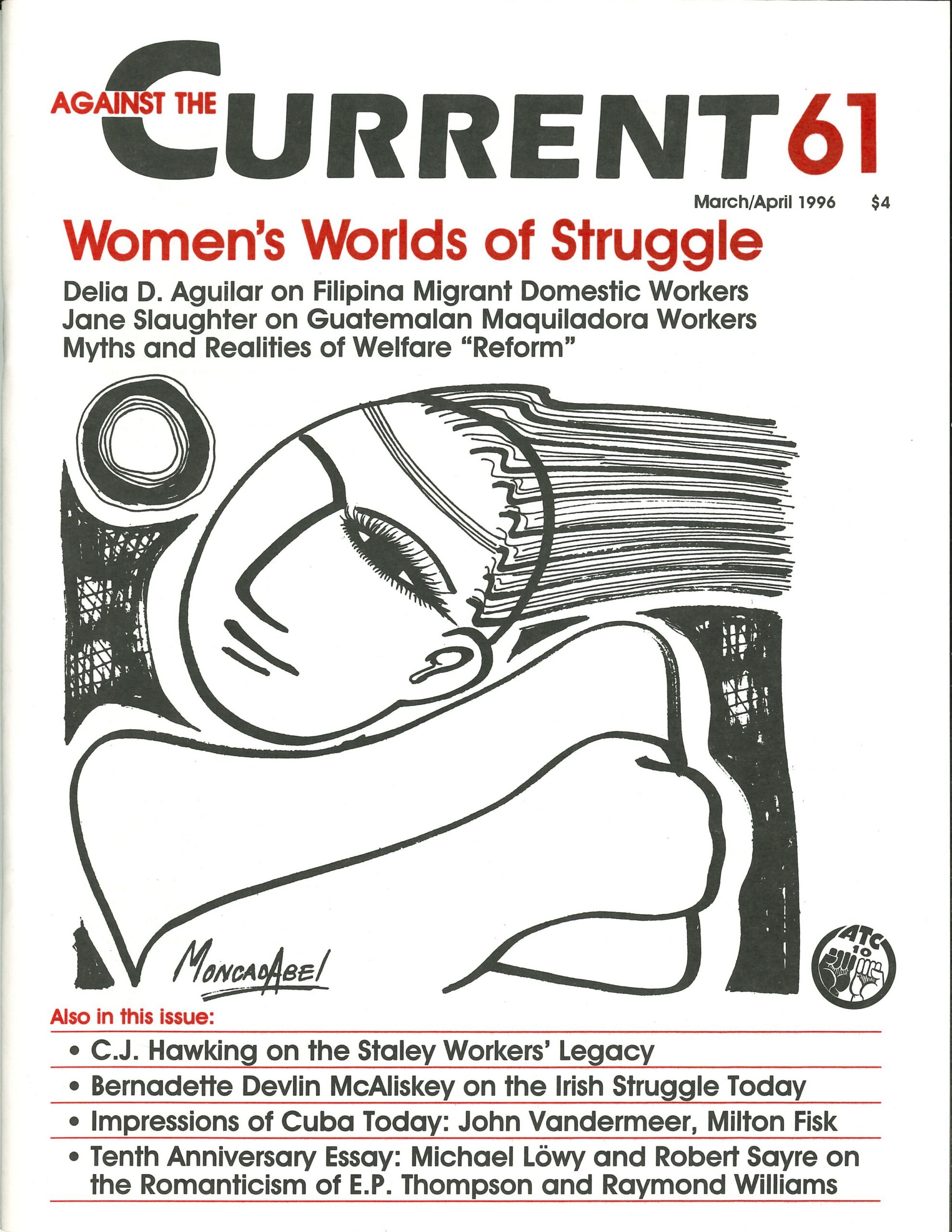Against the Current, No. 61, March/April 1996
-
NATO's Squalid Police Action
— The Editors -
Staley's Legacy of Struggle, Lessons of Defeat
— C.J. Hawking -
Detroit Newspaper Strike: A Bitter Winter
— David Finkel -
In France, A Glimpse of Labor's Power
— Mia Butzbaugh -
Reflecting on the Cuban Revolution
— John Vandermeer -
Cuba: The Party, the Market
— Milton Fisk -
An Irish Revolutionary's Challenge
— Peter Downs -
Democracy or Hibernianism?
— Bernadette Devlin McAliskey -
Structures of Discrimination
— an interview with Bernadette Devlin McAliskey - The MacBride Principles
-
Why the Ceasefire Ended
— Jim Dee -
Romanticism in the English Social Sciences: E.P. Thompson & Raymond Williams
— Michael Löwy and Robert Sayre -
Radical Rhythms: The Relevance of Rap
— Tyrone Williams -
The Rebel Girl: Blowing the Whistle on Sexism
— Catherine Sameh -
Random Shots: Kampfer's Modest Suggestions
— R.F. Kampfer - A Symposium on Imperialism Today
-
On Imperialism
— The Editors -
Imperialism and the Left
— Catherine Samary -
The Empire and Left Illusions
— Thomas Harrison - For International Women's Day
-
Servants to the Global Masters
— Delia D. Aguilar -
Guatemalan Women's New World of Struggle
— Jane Slaughter -
Main Courts, Not Just Desserts
— Jane Slaughter -
A Unionist's Life
— Jane Slaughter -
Michigan's "Welfare Reform"
— an interview with Kathleen Gmeiner -
Fighting for Our Families' Lives
— an interview with Sylvia Mitchell -
Welfare Reform, Then and Now
— Amy Hanauer - Dialogue
-
A Radical Alternative in 1996
— Eric Chester - In Memoriam
-
Christopher Columbus Alston: Organizer, Fighter and Historian
— Robin D.G. Kelley -
Alma Strowiss, Organizer-Activist
— Andrea Houtman
Jane Slaughter
IN FEBRUARY 1995, maquila worker Debora Guzmán was kidnapped as she walked to the market to buy food for lunch. She was involved in an organizing drive at the L&L factory outside Guatemala City. She had been threatened before, and her husband had advised her not to go out, but, she told herself, “It’s only two blocks.”
“They took me to the highway, under a bridge, they covered my eyes,” she remembered. “They put me in a car, they tied me up, they injected me, and I passed out.”
After driving her 200 kilometers away, at nine the next morning Guzmán’s captors instructed her to call her husband. She was to tell him to abandon his own union struggle: Felix Gonzales is the leader of a long battle to reopen the famous Lunafil plant, next door to the maquila where Guzmán works.
She called the office of the union federation UNSITRAGUA, to which both she and Felix belonged. Everyone there knew that she had been kidnapped. Hugo Morales, the staffer who answered the phone, remembers that she sounded woozy, but that she kept reassuring him that she was fine. He heard her captors in the background.
Finally Guzmán said, “Hugo? Please give a message to Felix. Tell him that whatever happens, he should not give up” (“pase lo que pase, que no renuncie”). Morales heard her being hit in the face, and the line went dead. She was dumped by the side of the road.
A few months later, Guzmán told an American visitor, “Felix says to me that I’m very stubborn, but he’s the same. I told him, Look, neither can I tell you to quit, because I too am in an organization, and how can I tell you to quit, if I don’t want to? I told him, this is your decision, because I’m not going to tell you to quit, no way.”
In the next few months, Guzmán received more death threats if she did not pressure Gonzalez, including threats against the child she was carrying.
Guzmán says she learned her combative ways early, answering back to her two older sisters. In the factory, when Korean supervisors yelled at the workers to get them to work faster, “There were many of us who wouldn’t put up with it. They could shout at us, and we would answer back.
“We didn’t have a union yet, but I never let them yell at me. I said they weren’t going to tell me what to do, because I knew how to do my work. Besides, the salary they were paying wasn’t enough that they should make us put out more work.”
Guzmán tells how the union was born:
“The owners sold the company to other Koreans, and these Koreans started to impose rules. They wanted us to come in at 7:15 [instead of 7:30], but they didn’t want to pay us for those fifteen minutes. No one agreed. We all agreed among ourselves that we’d go in at 7:30. And we even said–there were some people among us who were pretty aggressive–that if anyone did go in at 7:15, we’d take them out ourselves.
“Everyone arrived at 7:15, but no one went in. Then, at 7:25, they began to go in. At 7:30, they closed the doors, and left 58 people outside.
“But among those fifty-eight there was a girl who knew what a union was. She knew people, and they talked.” A meeting was called in a nearby park. “And that’s how we got organized.”
As of January, 1996, the L&L union was still trying to negotiate a contract.
After the kidnapping, L&L’s chief of personnel advised Guzmán to quit. “He said to me, `How do you stand it, these Koreans? Why are you still here?’
“I told him, `In my house, when I go to bed at night, I don’t know where the food is coming from. But if you think that I will leave the organization–no. I wouldn’t give them the pleasure.'”
ATC 61, March-April 1996

